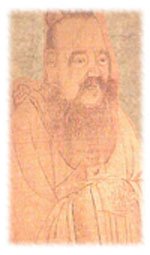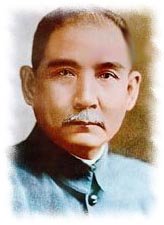Learning & Literature -- Philosophy
Traditional Philosophy
The Chinese valued the mind more than material things. They thought very highly of making it possible for human beings to live harmoniously and happily amongst one another. However, the Chinese still appreciated wealth but saw no benefit from wealth that did not bring a fuller enjoyment and a greater satisfaction of life.

|
Mencius, a disciple of Confucianism during the 4th century, believed that humans possessed a good nature at birth and that the environment corrupted them. Mencius promoted Confucianism and was the primary detractor of his contemporary Mozi (Mo Tzu). Mozi advocated utilitarianism (using the welfare of the people as a criterion of the correct moral path). Mozi did not search for the ultimate moral principle. He searched for a constant standard of moral interpretation and guidance. Because he thought traditionalism did not gaurantee the correct moral path, Mozi did not treat tradition as the standard for moral behavior, and therefore, he attacked commonsense traditionalism (Confucianism). By challenging previous judgements and institutions, Mohist ideas could only be seen by the people within the tradition as immoral. Mohism died out when the ruling dynasty promoted a Confucian Orthodox. Ironically, Mencius caused the absorption of Mohist ideas by abandoning traditional Confucianism and engendering a Confucianism which included Mohist principles.
Taoism grew from the debate between Confucian and Mohist ideas. Taoism has individualistic and mystical character, greatly influenced by nature. The Tao literally means "the way" and is the central idea of the philosophy.

|
The Taoist philosophy as quoted by Chuang Tzu:
"To regard the fundamental as the essence, to regard things as coarse, to regard accumulation as deficiency, and to dwell quietly alone with the spiritual and the intelligent -- herein lie the techniques of Tao of the ancients."
Modern Philosophy
In the last century, the Chinese have adopted Western ideas and philosophies. After the British defeated the Chinese in 1842, the Chinese questioned whether they were better than the Westerners. As the European Countries began to establish their Spheres of Influence in China, many of the Chinese people realized the need to adopt Western techniques and ideas.

|
When the Chinese Communists took over in 1949, the Chinese philosophy changed drastically. The Chinese masses looked upon economic equality with great favor. Confucius and Mencius condemned economic exploitation. The Chinese have always distrusted concentrated economic power and wealth in the hands of an individual. With this background and Communist propoganda, Mao Tse-tung and his party easily sold the idea of Communism to the people.
Today, young people increasingly admire Western culture. However, Confucianism will always influence every Chinese because it is an integral part of Chinese culture. In general, Chinese thinkers regard Confucianism as the philosophy of the past and Western philosophy as that of the future.



 Chinese Culture
Chinese Culture